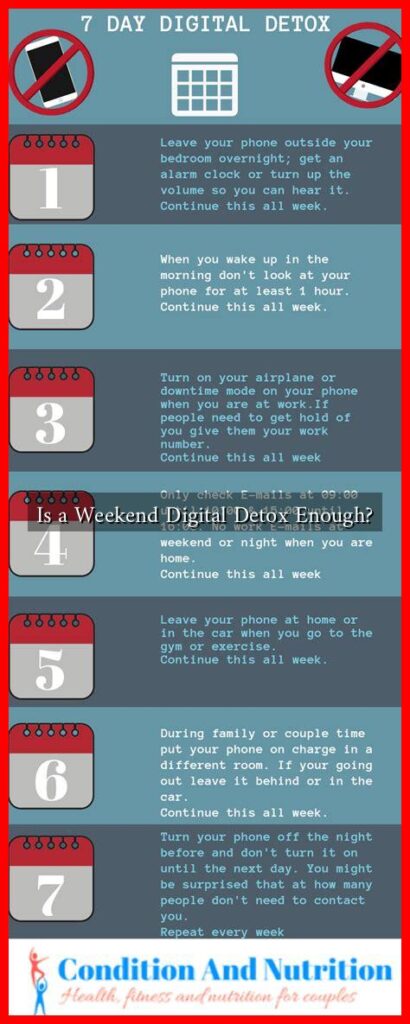-
Table of Contents
Is a Weekend Digital Detox Enough?
In our hyper-connected world, the concept of a digital detox has gained significant traction. Many people are beginning to recognize the need to unplug from their devices to improve mental health and overall well-being. But the question remains: is a weekend digital detox enough to make a meaningful impact? This article explores the benefits and limitations of short-term digital detoxes and offers insights into how to create a more sustainable approach to reducing screen time.
The Rise of Digital Detoxes
Digital detoxes have become a popular trend, with many individuals and organizations promoting the idea of taking breaks from technology. According to a study by the Pew Research Center, 46% of Americans feel overwhelmed by the amount of information they receive daily. This has led to increased stress, anxiety, and even depression. As a result, many are turning to digital detoxes as a solution.
Understanding the Weekend Detox
A weekend digital detox typically involves abstaining from all digital devices from Friday evening to Sunday evening. The idea is to reconnect with oneself, engage in face-to-face interactions, and enjoy nature without the distractions of social media, emails, and notifications. While this can provide a refreshing break, it raises the question of whether such a short period is sufficient for lasting change.
Benefits of a Weekend Digital Detox
- Immediate Stress Relief: A weekend away from screens can lead to immediate reductions in stress levels. A study published in the journal Psychological Science found that participants who took breaks from technology reported lower stress and improved mood.
- Enhanced Relationships: Spending quality time with family and friends without the interference of devices can strengthen relationships. A survey by the American Psychological Association found that 70% of respondents felt more connected to their loved ones when they engaged in activities without screens.
- Increased Mindfulness: A digital detox encourages mindfulness and self-reflection. Engaging in activities like reading, hiking, or meditating can help individuals reconnect with their thoughts and feelings.
Limitations of a Weekend Detox
- Temporary Relief: While a weekend detox can provide short-term benefits, it may not address the underlying issues related to technology overuse. Many individuals return to their old habits once the weekend is over.
- Digital Dependency: For some, the need to check emails or social media can be overwhelming. A weekend detox may not be enough to break the cycle of dependency on digital devices.
- Limited Impact on Habits: A brief detox may not lead to long-term changes in behavior. Research indicates that sustainable change often requires more extended periods of adjustment and conscious effort.
Case Studies and Real-Life Examples
Several organizations and individuals have experimented with longer digital detoxes to assess their impact. For instance, the “Digital Detox” retreat in California offers week-long programs where participants engage in activities like yoga, hiking, and workshops focused on mindfulness. Feedback from participants indicates that longer detoxes lead to more profound insights and lasting changes in behavior.
Another example is the “Screen-Free Week,” an initiative that encourages individuals and families to unplug for an entire week. According to reports from participants, many experienced significant improvements in their mental health and family dynamics, suggesting that longer detox periods may be more effective.
Creating a Sustainable Digital Detox Plan
If a weekend detox isn’t enough, how can individuals create a more sustainable approach to reducing screen time? Here are some strategies:
- Set Boundaries: Establish specific times for checking emails and social media. This can help reduce the impulse to constantly check devices.
- Engage in Offline Activities: Find hobbies that do not involve screens, such as painting, gardening, or playing sports.
- Practice Mindfulness: Incorporate mindfulness practices into daily routines, such as meditation or journaling, to help manage stress and improve focus.
- Gradual Reduction: Instead of a complete detox, gradually reduce screen time by setting daily limits.
Conclusion
While a weekend digital detox can provide immediate benefits such as stress relief and improved relationships, it may not be sufficient for long-term change. The limitations of short-term detoxes highlight the need for a more sustainable approach to managing screen time. By setting boundaries, engaging in offline activities, and practicing mindfulness, individuals can create a healthier relationship with technology. Ultimately, the goal is not just to unplug for a weekend but to cultivate a lifestyle that prioritizes mental well-being and meaningful connections.
For more insights on digital detoxes and mental health, consider visiting Psychology Today.

